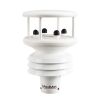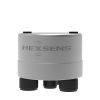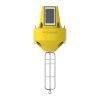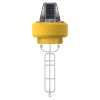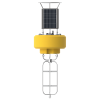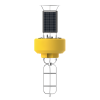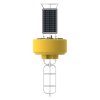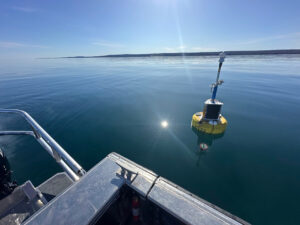Gill MaxiMet Compact Weather Stations
Features
- High quality sensors provide reliable measurements
- Integrated, multi-sensor design reduces deployment cost
- Low power mode for power sensitive applications
- Expedited repair and warranty service
- Lifetime technical support
- More
Overview
The Gill MaxiMet compact weather stations are designed for use on land and marine applications both for stand-alone measurement or integrated into larger systems. The Gill MaxiMet Compact Weather Stations incorporate many measurement parameters required for demanding applications.
Output
Output protocol options for MaxiMet include RS232, RS422, RS485, SDI-12, MODBUS and NMEA, ensuring MaxiMet is easy to install and easy to use. Environmental protection is IP66 across all MaxiMet models. Ultrasonic technology is used in MaxiMet models to deliver highly accurate measurements with no moving parts to wear or recalibrate. As a result, MaxiMet is extremely reliable and low-maintenance.
Available Parameters
- Wind speed and direction
- Air temperature
- Relative/absolute humidity
- Pressure
- Precipitation
- Solar radiation
- GPS coordinates
- MSL (Mean Sea-Level) pressure
- True wind
- Clock
- Longitude and latitude
- Solar noon
- Sunrise
- Sunset twilight
- Ground speed
- Compass
- 2D coordinate/apparent
- Wind
- Location
- Height above sea level
- Averaging (World Meteorological Organization)
- Gust (World Meteorological Organization)
- Air density
- Barometric pressure
- Wet bulb
- Dew point
- Wind chill
- Sensor status information
- Heat index and more
In The News
Great Lakes Research Center: Designing Targeted Monitoring Solutions
According to the National Oceanic and Atmospheric Administration ( NOAA ), the Great Lakes have more miles of coastline than the contiguous Atlantic and Pacific coasts combined and contain 20 percent of the world's freshwater, making it a critical region to protect and conserve. Continuous monitoring and data-informed resource management are key components of managing waters in the region. Hayden Henderson, a research engineer with the Great Lakes Research Center (GLRC), designs and deploys monitoring platforms throughout the Great Lakes. With a background in environmental engineering, Henderson enjoyed the challenge of creating systems and making them work to obtain difficult, remote measurements.
Read MoreThree Decades of Research at Acton Lake
A multi-disciplinary team at Miami University, Ohio, has been studying the environmental change at Acton Lake for over three decades. Using three different NexSens buoys over this time, the team has an incredible archive of data that is helping build a picture of Acton’s past, present, and future. Until recently, a NexSens CB-50 buoy was used alongside other environmental monitoring at Acton Lake. In May 2025, the Miami team deployed a new XB-200 buoy , future-proofing their ongoing monitoring using real-time buoy systems. Acton Lake, a small hypereutrophic reservoir in southwest Ohio, covers 2.4km² and has a maximum depth of about 8m. The dam was built in 1956, and the lake has a large agricultural watershed.
Read MoreSource Water Monitoring in Albany, New York: Tracing Water Quality throughout Tributaries
Thousands of US cities pull their drinking water from natural source waters like reservoirs, rivers, and streams, making overall watershed health a key consideration for water providers. In Albany, New York, the Albany Department of Water and Water Supply delivers drinking water to over 100,000 residents as well as monitors and manages the larger drinking water supply watershed. Hannah Doherty, Environmental Specialist at the Albany Department of Water and Water Supply , spends her days working with a small team to monitor the drinking supply and the connected water bodies. Doherty explains, “We’re the first to encounter the water that ends up being the drinking water.
Read More




















